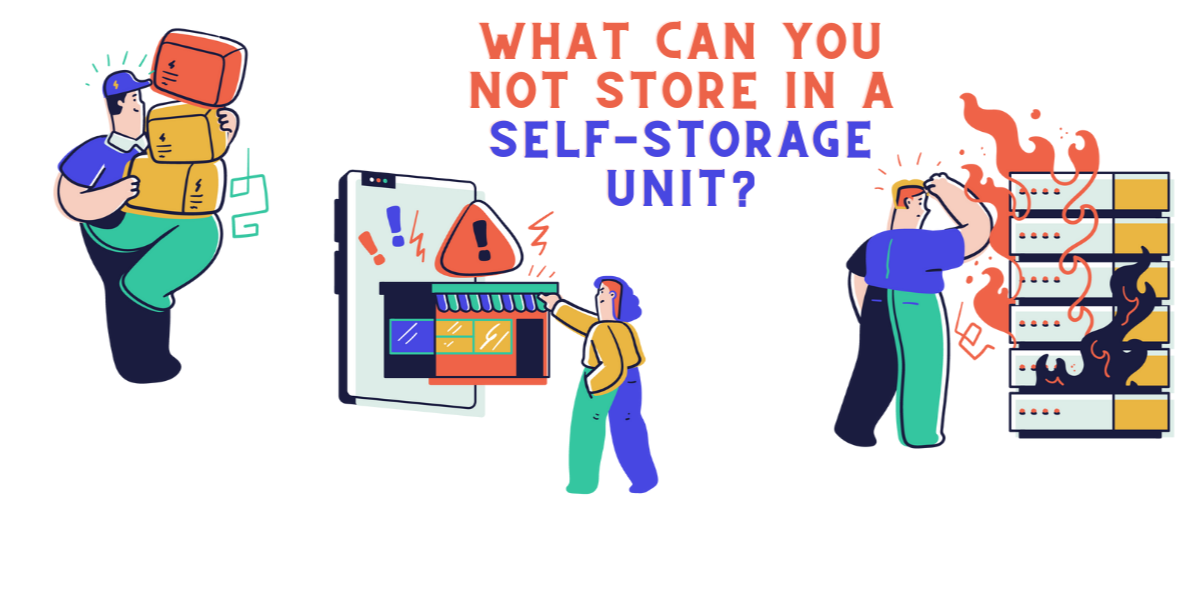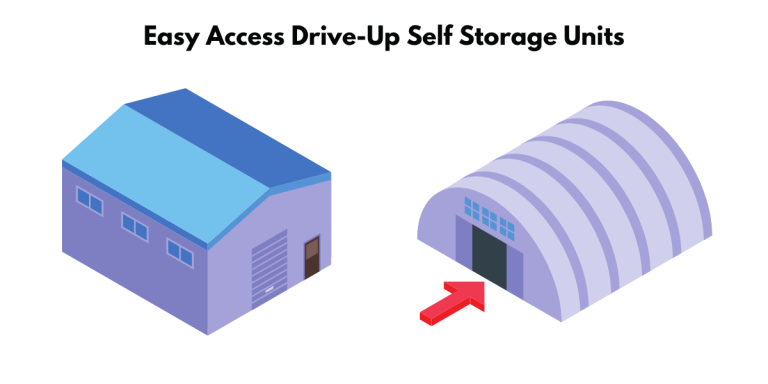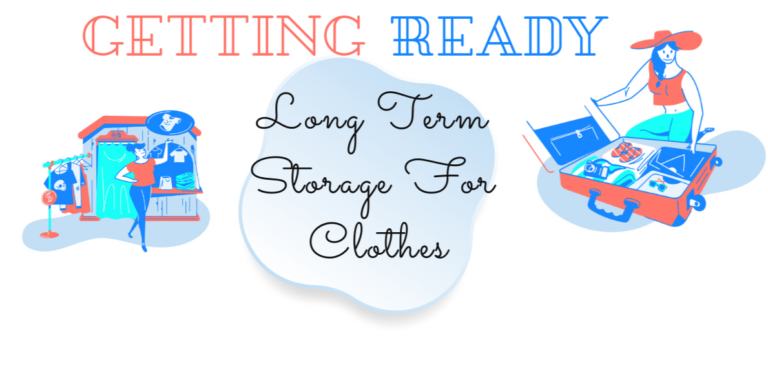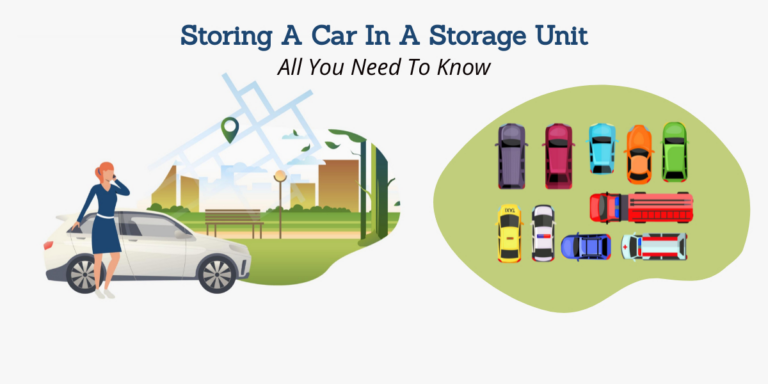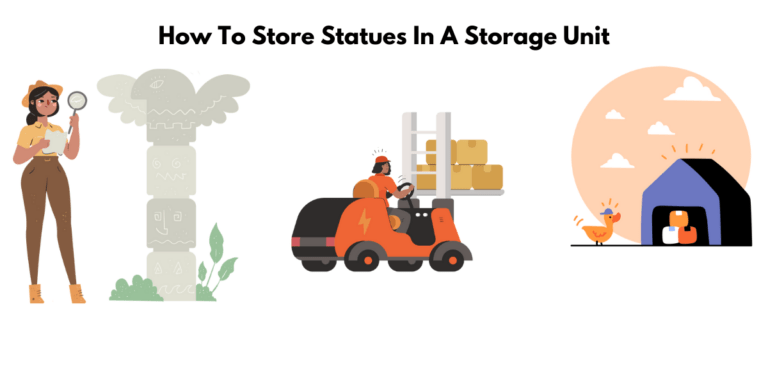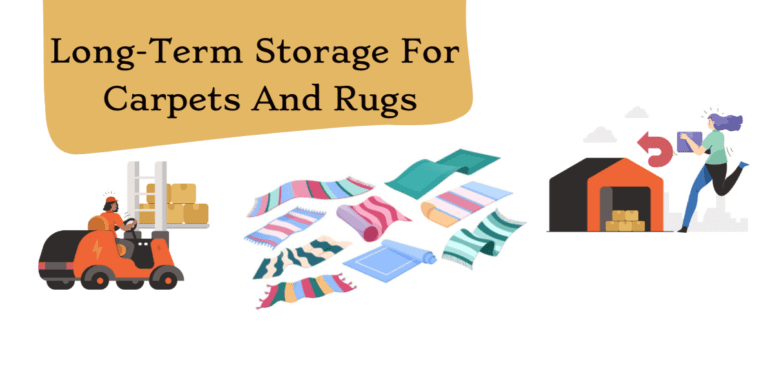A List of Things Not To Store in a Self-Storage Unit
Things Not To Store in a Self-Storage Unit: Tips to Keep Your Unit Secure
Self-storage units are a popular option for people who want to store their belongings while they’re on the go. There are rules and exceptions about what you can and cannot put in a storage unit, but not all self-storage customers know this information.
You should avoid storing things in your self-storage unit, including anything considered hazardous or radioactive, even if it’s just briefly misplaced. If you need help finding out whether something is safe to store in your storage unit, consult the U.S. Department of Energy materials safety data sheet or your storage unit’s terms and conditions for more information.
Lists of things to avoid storing in a self-storage unit are helpful, but there’s more than meets the eye. We’ve got some tips for you if you want your items stored with care and protection from potential damage!
What is a self-storage unit?
A self-storage unit is a small, enclosed space where the tenant can store personal belongings. It usually has steel or concrete walls and a roof to keep items dry and secure from the elements. If you rent one of these units, make sure a weatherproof covering covers it on top to avoid water damage if there are any leaks in the ceiling.It offers temporary or long-term storage for the homeowner, tenant, or business. It’s perfect for those in need of space when moving, downsizing, and storing items such as RVs, motorcycles, and boats.
Storage units are an excellent location to store clothes because they prevent mildew from ruining clothing and prevent damage due to weather exposure by keeping them dry and away from bad conditions like rainstorms.
It is also a great place to store possessions that you may not want in your home anymore. This includes seasonal clothes, old furniture, and personal items such as photos or toys. It’s also suitable for storing more expensive items like electronics and computers because of its climate control features which maintain a set temperature throughout the storage unit.
They offer a variety of features such as 24-hour access, lock and key, climate control, and video monitoring. The price varies depending on the length of time rented, add-ons like insurance, or additional security measures.
Self-storage is a secure location that can be used to store any kind of property. However, certain items should not be stored in self-storage units because they are likely to get damaged or stolen. Items like paintings and furnishings cannot stand up against the elements, so they should only be kept for short periods before being moved into an indoor space where it won’t damage them further.
The list of things to store in a self-storage unit is quite extensive. For example, homeowners insurance can cover items while they’re stored for up to 30 days if the owner activates it before any damages occur or when there’s no homeowner’s policy available.
Pull quotes from storage facilities near your home are also provided, so you know what kind of services and amenities you will receive at each facility.
How much do storage units cost to rent?
A self-storage unit is a place to store your belongings while away. Most people rent them when they are in college, but the prices for renting storage units vary depending on size and location.
Public storage is a company that provides storage units at low prices. The 5×5 foot storage unit usually costs around $35-$60 per month, depending on which location it’s in and whether or not you want climate control.
Storage facilities may vary in size and features, but one thing is for sure: storage units can often be expensive. The prices of storage space will depend on the facility’s accessibility, flexibility, security features, and maintenance.
The storage cost is affected by the number of units, size, and type. It also depends on where you choose to store your items.
Storage units come in a variety of shapes and sizes. Depending on the size needed, they are available to rent individually or as a unit. The price is determined by factors such as location, climate control options offered at the facility, the amount of storage space rented per month, and whether it’s delivered directly to your home or not.
There are many things to consider when deciding what to store in a self-storage unit. You will need to see if the facility offers climate control, security features and whether you want to store by size or by type.
Climate-controlled storage
A self-storage unit is a space that people rent out to store their items. There are three different storage units: upper level, climate-controlled and regular. Upper-level storage units will keep your items protected from the weather and humidity at an affordable price. Climate-controlled storage units keep your items safe year-round with a 65-85 degrees Fahrenheit temperature. This type of storage unit is recommended if you are storing sensitive household goods, electronic devices, appliances, valuables, artworks, and antiques. A standard storage unit will only extend up to two levels deep. Still, it does not have any additional features such as climate control or security cameras, so it’s recommended for smaller-sized objects like clothing or shoes.
How much is climate-controlled storage?
A self-storage unit is a building that offers storage for personal or business use. The price of these units depends on the size and climate. There are two types of buildings: indoor and outdoor.
Pricing for climate-controlled storage varies depending on the access level of the unit. If you want to save money, consider renting an upper-level unit or a first-floor one.
A climate-controlled storage unit is a place where its interior temperature is kept at a constant level. If you live in an area with extreme temperatures, or if your belongings are sensitive to heat or humidity, then climate-controlled storage could be for you.
Storage units with controlled temperatures are generally more expensive than non-climate control storage. With the cost of climate control, protection is significantly higher for valuable belongings than in uncontrolled environments.

Things you should never put into a storage unit
When storing something for an extended period, it’s important to remember that self-storage units can’t always protect your items. While some things are fine to store in a storage unit, several items should never be put into one.
Anything illegal
Things you should never put into a storage unit include illegal items, firearms, hazardous materials, animals with rabies, or other infectious diseases.
The rule of thumb is that anything illegal would include firearms and ammunition, military-grade weapons, and illicit drugs. For example, if you are found with a pistol or rifle without the proper license to carry it on your person, this could be classified as an “illegal item.”The storage unit should not be used for illegal activity.
Food and other perishables
Food is one of the worst things to put in a storage unit. Mice and pests have powerful noses that can detect food from miles away. The best way to keep food safe in your storage unit is to remove it when you are done with the contents. If you must store dry goods, be sure to do so in glass or thick plastic containers.
The recommended food for your pet should be appropriate to the animal’s age and weight. A healthy diet consists of various fresh foods, but some supplements like vitamin C and linoleic acid can also be added if necessary.
Living animals/pets
Do not ever put live animals or pets into a self-storage unit. It is not good for them, and it also poses a huge problem if other tenants find them in the facility.
Some animals are more likely to be harmful or annoying than others. For instance, cats can often be very destructive and noisy. It is not a good idea for plants either because they could get damaged by the animal’s claws or teeth if it becomes aggressive while trying to play with them.
The best way to prevent moisture from accumulating is by using a dehumidifier. The device will remove excess humidity and keep it out of the home.
Plants
Plants need sunlight to live, and they will die if not given enough light. It would be best never to put any plants into a storage unit because the lack of sunlight would kill them.
If you are looking for plants, there are many things to consider. First and foremost, make sure that they get enough light and do not die because of its lack.
If you cannot take care of your plants, don’t put them in storage. Give them away or plant them outside. If the conditions are not ideal for the plant to live inside, it is best if they stay indoors.
Scented or wet items
There are some things that you should never put into a storage unit. These include anything scented or wet, such as umbrellas.
It is important to note that scented candles can attract insects. The fragrance attracts the bugs and may be harmful or even deadly if they are near you while you sleep. People should use “wet” items like fabric softener sheets, dryer sheets, or liquid detergent instead of scented ones.
Scented items may seem like a better option because they can be left out for longer periods without the risk of mildew and mold growth. However, wet items should not stay in contact with each other to avoid growth.

Flammable materials
Do not store flammable materials in a self-storage unit because they can cause fires. The proper storage of flammable items is prohibited due to their danger. These items are not allowed because they may cause fires, explosions, or other serious injuries.
Explosives
Per National Fire Protection Association (NFPA) guidelines, explosives are prohibited. Store explosives in a safe place, and you will be held responsible for an explosion if it occurs.
Explosives are, in general, used for malicious purposes. The United States Code defines them as “any chemical compound or mechanical mixture that is commonly used or intended for the purpose of producing an explosion.”
Toxic or corrosive materials
If you need to store something in a self-storage unit, it is best not to put toxic or corrosive materials in the unit.
Some toxic materials are fertilizers, chemicals, chlorine bleach, acetone, turpentine, and paint thinner. These substances have a corrosive or strong oxidizing effect on the human body, leading to serious health problems if used improperly.
Uninsured vehicles or vehicles that aren’t operational
The insurance company will not be liable for damages caused by an uninsured or inoperable vehicle.
Vehicles you should never put into a storage unit:
- Uninsured vehicles, including cars and boats.
- Inoperable vehicles.
An uninsured vehicle is a motorized or non-motorized vehicle that doesn’t have any liability coverage. If the owner of an uninsured vehicle causes damages to someone else, they will not be able to recover from those damages. Uninsured vehicles are also called “junk” cars because most people don’t want them around their neighborhood or business for fear that they’ll cause more damage and become a safety hazard if left unattended on the street.
Uninsured vehicles or those that aren’t operational are not allowed on the road. This is because it increases public safety risks and makes traffic more congested, which leads to a higher risk of accidents.
You or your loved ones are not allowed in storage
Storage facilities are not allowed to allow anyone in the unit, including tenants and visitors. This is because it would be an illegal housing unit since laws have made it so that living in a storage unit is not permitted.
Storage units are typically not covered by insurance, which means that people living in storage units would need to pay for their damages and injuries.
Some storage facilities are not allowed to allow people to live in them. Some local and federal laws prohibit this practice, making it difficult for individuals who need a place to store their belongings while they move out of an apartment or house.

What can I store in a non-climate controlled storage?
The most weatherproof storage unit is steel-framed, but it’s also the most expensive. If you’re considering renting a metal storage unit to protect your belongings from the elements, make sure they are designed for outdoor use and located outside. Non-climate-controlled storage units should not be used if you want to store items such as electronics or footwear.
Wood storage units need a cover on top to prevent damage. This can be done using an opaque tarp, cardboard box, plastic sheeting, or metal roofing. Temporary storage while moving is possible for short periods with the use of these types of materials and equipment such as furniture and appliances that you don’t want to be damaged during transport.
Non-climate controlled storage units are ideal for storing items that don’t require the protection of a climate-controlled unit. However, if you plan to store items susceptible to mildew, mold, or damage from weather-related causes, it’s necessary to rent one of these storage spaces.
Although many people store their belongings in self-storage units, it can be difficult to know what you can and cannot store. Temperature control is necessary for all types of items, including clothes. The storage unit must protect from humidity or temperature extremes.
A storage unit can be rented for a specific amount of time. The unit’s price depends on the length of time it is rented, add-ons, insurance, and size. Common features include climate control, lock and key access, 24-hour access, video monitoring, and additional security measures.
It’s always a good idea to ensure your items while in storage, but it is even more important if you’re storing them in a non-climate controlled space. The nearest storage facility can be found by searching for the closest one near your home and easily comparing quotes.
Can you operate a business from a storage unit?
The idea of renting a storage unit is just a place to store your stuff when you’re not using it. However, some things should never be stored in a self-storage unit for business or home use.
Climate-controlled storage units are available for temperature-sensitive items, protecting them from the harsh environment of a self-storage unit.
Storing food or other items in these climate-controlled storage units is an effective way to protect against spoilage and any potential damage that could occur due to extreme temperatures.
You cannot operate a business from a storage unit. It may seem like an enticing idea, but it’s impossible because you can’t provide the necessary amenities to make this work.
Moreover, storage units are never clean, and they lack services such as restrooms or running water in most cases when compared with other options for commercial space rentals.
One of the major factors to consider when renting a self-storage unit is whether or not they accept deliveries. Suppose you’re planning on storing your business’s inventory. In that case, it will be important for them to process your delivery and provide an appropriate location away from where other storage units are stored.
Storing a business in a self-storage unit is an emerging trend, but it’s not without risks. The wide aisleways and boxes for sale can make storage units more inviting to customers who want to enter affordable spaces with low overhead costs.
However, the convenience of storing your belongings in one place comes with some risk factors, such as fire hazards from improper ventilation or theft when you’re away from the property.
- Heated Storage Units: What Are They And How Do They Work? - May 8, 2022
- A List of Things Not To Store in a Self-Storage Unit - October 29, 2021

